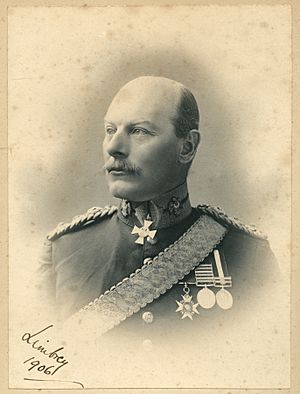George Limbrey Sclater-Booth, 2nd Baron Basing facts for kids
Quick facts for kids
George Sclater-Booth, 2nd Lord Basing
|
|
|---|---|
 |
|
| Born | 1 January 1860 New Street, Spring Garden, Whitehall |
| Died | April 8, 1919 (aged 59) Hoddington House, Hampshire |
| Allegiance | |
| Service/ |
|
| Years of service | 1892- |
| Rank | Brigadier-General |
| Unit | 1st Royal Dragoons |
| Battles/wars | Second Boer War |
| Awards | Companion of the Order of the Bath Order of the Red Eagle, Third Class |
| Spouse(s) | Mary Hargreaves |
George Limbrey Sclater-Booth, 2nd Baron Basing (born January 1, 1860 – died April 8, 1919) was an important British Army officer. He was also a peer (a member of the nobility) and a community leader in Hampshire, England.
Contents
Early Life and Family
George Sclater-Booth was the son of George Sclater-Booth, 1st Baron Basing and his mother, Lydia Caroline Birch. He went to school at Eton College, which is a famous boarding school. Later, he studied at Balliol College, Oxford, a well-known university.
In 1894, when his father passed away, George became the 2nd Baron Basing. This meant he inherited his father's title and became a member of the nobility. He also held important local roles. He was a Justice of the Peace (JP), which meant he helped keep law and order. He was also a Deputy Lieutenant for Hampshire, a role that supported the county's main representative.
George married Mary Hargreaves on December 12, 1889. Sadly, Mary passed away in India on June 1, 1904.
Military Career
George Sclater-Booth started his military career in the 1st (Royal) Dragoons regiment. He became a lieutenant in 1892. He quickly moved up the ranks, becoming a captain in 1897 and a major in 1898.
Serving in the Second Boer War
When the Second Boer War began in October 1899, his regiment, the 1st Dragoons, was sent to South Africa. They arrived in November and were part of the forces trying to help the town of Ladysmith.
Lord Basing and his regiment fought in several major battles:
- The Battle of Colenso in December 1899.
- The Battle of Spion Kop in January 1900.
- The Battle of the Tugela Heights in February 1900.
From June 1900 to April 1901, his regiment helped guard the Buffalo River and the areas leading into the Transvaal.
Leading His Own Column
In November 1900, Lord Basing was given a special temporary promotion to lieutenant-colonel. In 1901, he was given his own command. This group included his own regiment and some artillery. It was special because it was the only group during the war made up of just one regiment.
His column worked in the Magaliesberg and Western Transvaal areas in July and August 1901. For the rest of the war, they served in the Orange River Colony. In February 1902, he was officially promoted to lieutenant-colonel and became the commander of his regiment.
Awards and Recognition
For his brave service in the war, Lord Basing was recognized twice for his actions. He received the Queen's South Africa Medal with six special bars, showing he fought in many key areas. He also earned the King's South Africa Medal. In 1902, he was given the title of Companion of the Order of the Bath, a high honor for military service.
Later in 1902, he received another award, the 2nd class of the Prussian Order of the Red Eagle. This happened after Emperor Wilhelm II of Germany inspected the Royal Dragoons. The Emperor was the honorary colonel-in-chief of the regiment.
Later Life and Passing
Lord Basing passed away at the age of 59 on April 8, 1919. He died at Hoddington House, which was near Upton Grey in Hampshire, England. He was buried in the churchyard of St. Mary's Church in Upton Grey.
 | Kyle Baker |
 | Joseph Yoakum |
 | Laura Wheeler Waring |
 | Henry Ossawa Tanner |

